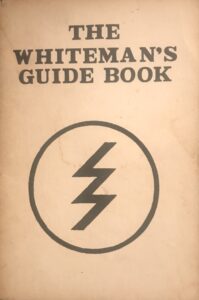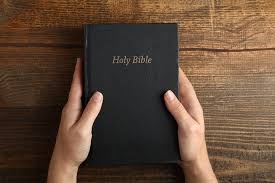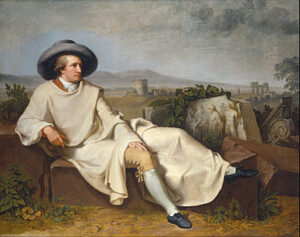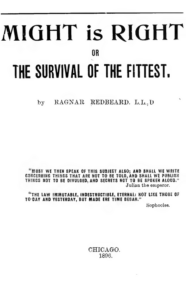How is it that ‘men of light and leading’ hardly ever call in question the manufactured ‘moral codes,’ under which our once vigorous Northern race is slowly and surely eating out its heart in peaceful inaction and laborious dry-rot?
Standard ‘moral principles’ are arbitrarily assumed by their orthodox apologist to be a fixed and unalterable quantity, and that to doubt the divine-rightness of these ‘principles’ is treason and sacrilege. When the greatest thinkers of a race are incapable, or afraid to perform their manifest and logical function, it is scarcely to be wondered that average citizens are also somewhat unwilling to ‘risk life, fortune and sacred honour’ for the overthrow of popularized ‘right and wrong’ concepts, that they know from bitter personal experience, are unworkable falsities.
 Note of the Editor: Of this collage of Western thinkers, only Machiavelli, Darwin, Nietzsche (and perhaps Jung) could be useful for the sacred words. Whoever put together this collage was unaware that there is a brutal discontinuity between the Greek philosophers and the theologians beginning with St. Augustine. Cf. Karlheinz Deschner’s
Note of the Editor: Of this collage of Western thinkers, only Machiavelli, Darwin, Nietzsche (and perhaps Jung) could be useful for the sacred words. Whoever put together this collage was unaware that there is a brutal discontinuity between the Greek philosophers and the theologians beginning with St. Augustine. Cf. Karlheinz Deschner’s
Christianity’s Criminal History, here and here.
Although the average man feels in his heart that nearly all political and religious conventionalisms are dynamic deceits, yet how cautiously he avoids any open display of antagonism thereto? He has not the courage of his opinions. He is afraid to say openly what he thinks secretly. In other words he is living in a state of subjectiveness; of vassalage. He allows his brain to be dominated and held in bondage by the brain of another. From his infancy he has been deliberately subjected to a continuous external pressure, especially designed to coerce his understanding into strict accord with pre-arranged views of moral, political or religious ‘duty.’ He has not been permitted one moment of real mental liberty. He imbibed fraudulent conventionalisms with his mother’s milk. He listens to the most hideous lies being glorified in his presence as sublime truths.
He hears falsehoods sung in swelling chorus. He hears them sounded on bugles of silver and brass. He hears them intoned by congregations of the faithful amid peals of sacred music, and the solemn roll of chanted prayer. Thus his mind is sterilized by authority before it has had a chance to mature. Thus youth is mentally castrated, that its natural vitality may be afterwards used up in the yoke of custom—which is the yoke of slavery. In the nursery, at school, and at college, plastic brain-pulp is deliberately forced into the pre-arranged mould. Everything that a corrupt civilisation can do, is done to compress the growing intellect into unnatural channels. Thus the great mass of men who inhabit the world of today have no initiative, no originality or independence of thought, but are mere subjective individualities, who have never had the slightest voice in fashioning the ideals that they formally revere.
Although the average man has taken no part in manufacturing moral codes and statute laws, yet how he obeys them with dog-like submissiveness? He is trained to obedience, like oxen are broken to the yoke of their masters. He is a born thrall habituated from childhood to be governed by others.
Chinese civilization deliberately distorts its children’s feet, by swathing them in bandages of silk and hoop-iron. Christian civilization crushes and cramps the minds of its youth by means of false philosophies, artificial moral codes and ironclad political creeds. Deleterious sub-theories of good and evil are systematically injected into our natural literatures, and gradually (without serious obstruction) they crystallize themselves into cast-iron formulas, infallible constitutions, will-o-the-wisp evangels, and other deadly epidemics.
Modern ‘leaders of thought’ are almost wholly wanting in originality and courage. Their wisdom is foolishness, their remedies poison. They idiotically claim that they guide the destinies of nations, whereas, in reality, they are but the flotsam and scum-froth that glides smoothly down the dark stream of decadence.
Thus all the people of the earth are helpless, Seeing those that lead are blind.
Mankind is aweary, aweary of its sham prophets, its demagogues and its statesmen. It crieth out for kings and heroes. It demands a nobility—a nobility that cannot be hired with money, like slaves or beasts of burden. The world awaits the coming of mighty men of valour, great destroyers; destroyers of all that is vile, angels of death. We are sick unto nausea of the ‘good Lord Jesus,’ terror-stricken under the executive of priest, mob and proconsul. We are tired to death of ‘Equality.’ Gods are at a discount, devils are in demand. He who would rule the coming age must be hard, cruel, and deliberately intrepid, for softness assails not successfully the idols of the multitude. Those idols must be smashed into fragments, burnt into ashes, and that cannot be done by the gospel of love.
The living forces of evil are to be found in the living ideals of today. The Commandments and laws and moral codes that we are called upon to reverence and obey are themselves the insidious enginery of decadence. It is moral principles that manufacture beggars. It is golden rules that glorify meekness. It is statute laws that make spaniels of men.
A man may keep every one of the Ten Commandments and yet remain a fool all the days of his life. He may obey every written law of the land, and yet be a caitiff and a slave. He may ‘love Jesus,’ delight in the golden rule and yet continue to the hour of his death, a failure and dependent. Truly the way to hell is by fulfilling the commandments of God. If the all-conquering race to which we belong, is not to irretrievably dwindle into multitudinous nothingness (like the inferior herds it has outdistanced or enslaved), then it is essential that the Semitic spider webs (so astutely woven for ages into the brains of our chiefs) be remorselessly torn out by the very roots, even though the tearing out process be both painful and bloody.
If we would retain and defend our inherited manhood, we must not permit ourselves to be forever rocked to repose, with the sweet lullabies of eastern idealisms. Too long we have been hypnotized by the occult charm of Hebrew Utopianism. If we continue to obey the insidious spell that has been laid upon us, we will wake up some dread morning with the gates of hell—of hell upon earth yawning wide open, to close again upon us forever…
In actual operation Nature is cruel and merciless to men, as to all other beings. Let a tribe of human animals live a rational life, Nature will smile upon them and their posterity; but let them attempt to organize an unnatural mode of existence an equality elysium, and they will be punished even to the point of extermination.
 I mentioned that I still had the original booklet that James Madole gave me—see attached (the cover was orignally white but has been discolored a little with age).
I mentioned that I still had the original booklet that James Madole gave me—see attached (the cover was orignally white but has been discolored a little with age).



